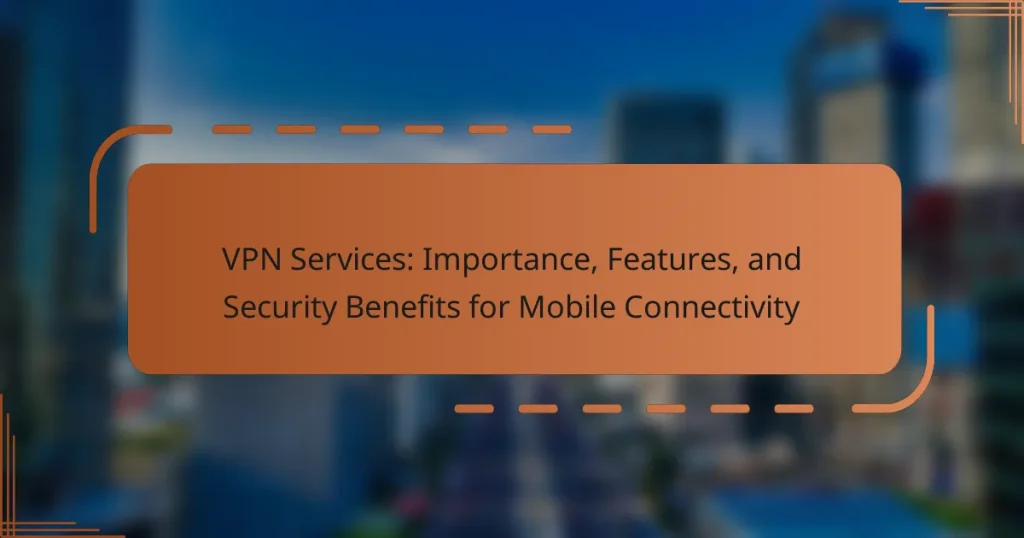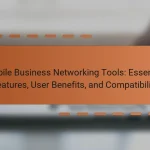VPN services are tools that establish secure internet connections by encrypting user data and masking IP addresses, thus enhancing online privacy and security. They protect sensitive information from potential hackers and enable access to geo-restricted content. Key features to consider when selecting a VPN include strong encryption, a no-logs policy, a wide server network, and additional functionalities like a kill switch and multi-device support. VPNs also offer significant security benefits for mobile users by encrypting internet traffic and improving anonymity, especially on public Wi-Fi networks. Overall, the increasing adoption of VPNs underscores their vital role in safeguarding online activities and data.
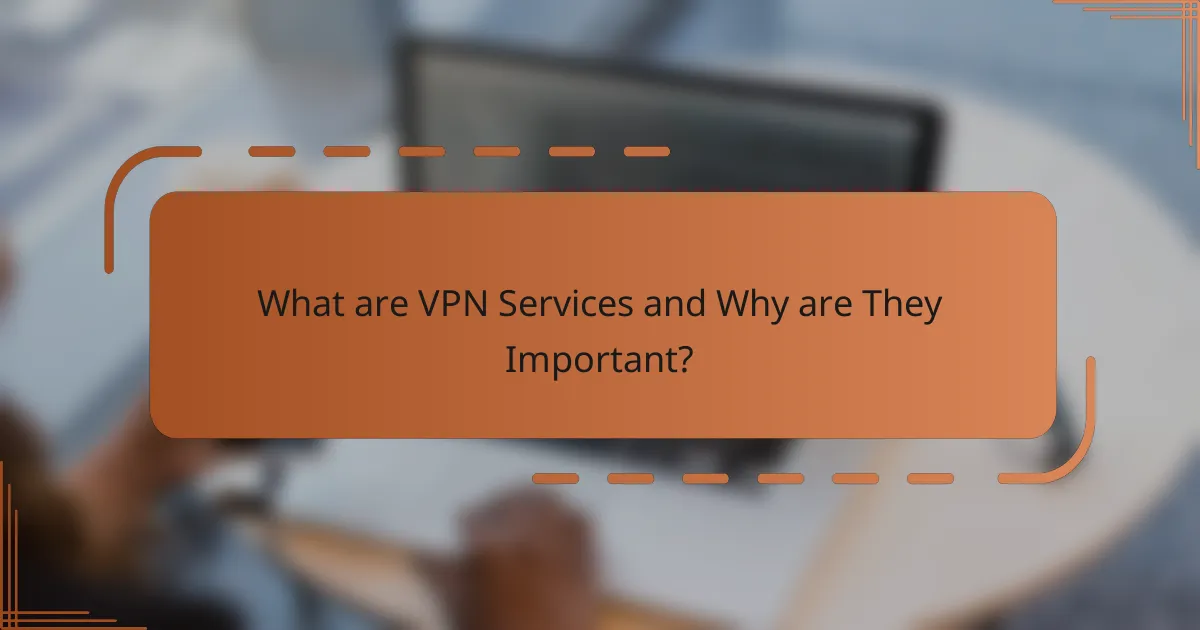
What are VPN Services and Why are They Important?
VPN services are tools that create a secure connection over the internet. They encrypt user data and mask IP addresses. This enhances privacy and security while browsing online. VPNs are important because they protect sensitive information from hackers. They also allow users to access geo-restricted content. According to a 2021 report by GlobalWebIndex, 31% of internet users globally used a VPN at least once. This shows the growing importance of online privacy.
How do VPN Services enhance online privacy?
VPN services enhance online privacy by encrypting internet traffic and masking IP addresses. This encryption secures data from potential eavesdroppers. Users’ online activities become more difficult to track. VPNs create a secure tunnel between the user’s device and the internet. This tunnel prevents third parties from accessing sensitive information. Additionally, VPN services can bypass geographic restrictions, allowing access to content without revealing the user’s location. According to research by the Electronic Frontier Foundation, VPNs significantly reduce the risk of data interception. This makes VPNs a valuable tool for maintaining online privacy.
What technologies do VPNs use to secure data?
VPNs use encryption protocols to secure data. These protocols include OpenVPN, L2TP/IPsec, and IKEv2/IPsec. Encryption transforms data into a code that is unreadable without the correct key. This ensures that even if data is intercepted, it remains secure. VPNs also utilize tunneling to create a private network over the internet. Tunneling encapsulates data packets, preventing unauthorized access. Additionally, VPNs employ authentication methods to verify user identity. This adds another layer of security, ensuring only authorized users can connect. These technologies collectively protect user data from eavesdropping and cyber threats.
How do VPNs protect against data breaches?
VPNs protect against data breaches by encrypting internet traffic. This encryption prevents unauthorized access to sensitive data. It creates a secure tunnel between the user’s device and the VPN server. This means that even if data is intercepted, it remains unreadable.
Additionally, VPNs mask the user’s IP address. This makes it difficult for attackers to track online activities. A study by the Cybersecurity & Infrastructure Security Agency (CISA) highlights that encryption significantly reduces the risk of data exposure.
By using a VPN, users can connect to public Wi-Fi networks safely. Public networks are often targets for data breaches. The use of a VPN adds an essential layer of security in these environments.
What role do VPN Services play in mobile connectivity?
VPN services enhance mobile connectivity by providing secure and private internet access. They encrypt data transmitted over mobile networks. This encryption protects user information from potential cyber threats. VPNs also enable users to bypass geographical restrictions. They allow access to content that may be blocked in certain regions. Furthermore, VPNs can improve network performance by reducing bandwidth throttling. According to a study by Cybersecurity Ventures, VPN usage has increased by over 30% in recent years due to rising privacy concerns. This indicates a growing reliance on VPN services for secure mobile connectivity.
How do VPNs improve security on public Wi-Fi networks?
VPNs improve security on public Wi-Fi networks by encrypting user data. This encryption makes it difficult for hackers to intercept sensitive information. Public Wi-Fi networks are often unsecured, increasing the risk of data breaches. VPNs create a secure tunnel between the user’s device and the internet. This tunnel protects data from eavesdroppers and malicious actors. According to a study by the Cybersecurity & Infrastructure Security Agency, using a VPN significantly reduces the risk of data theft on public networks. Therefore, VPNs are essential for maintaining privacy and security in public Wi-Fi environments.
What are the implications of using VPNs for mobile data usage?
Using VPNs for mobile data usage can lead to increased security and privacy. VPNs encrypt data, making it difficult for hackers to intercept information. This is especially important on public Wi-Fi networks, which are often unsecured. Additionally, VPNs can help bypass geographic restrictions on content. Users can access services that may be blocked in their region. However, using a VPN may also slow down internet speeds due to encryption processes. Some mobile data plans may have limitations on data usage, which can be affected by the VPN. Overall, the implications of using VPNs for mobile data usage include enhanced security, potential speed reduction, and the ability to access restricted content.
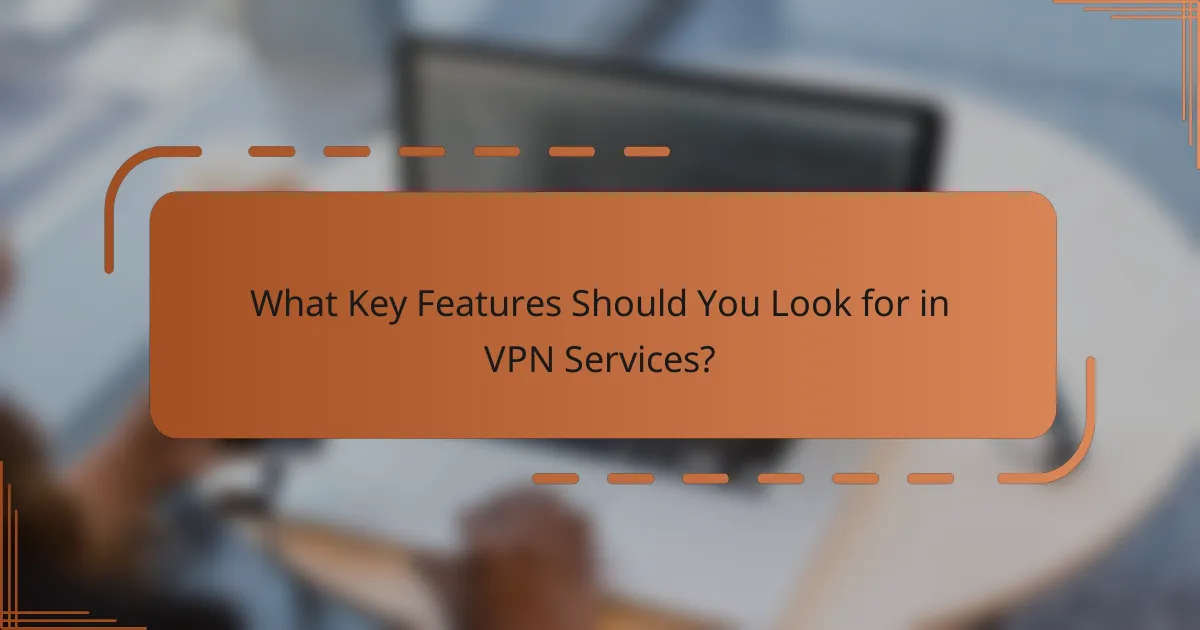
What Key Features Should You Look for in VPN Services?
Key features to look for in VPN services include strong encryption, a no-logs policy, and a wide server network. Strong encryption protects your data from unauthorized access. A no-logs policy ensures that your online activities are not tracked or stored. A wide server network provides better connectivity options and speeds. Additionally, look for features like a kill switch, which disconnects your internet if the VPN fails. This prevents data leaks. Multi-device support allows you to use the VPN on various devices simultaneously. Customer support is also crucial for troubleshooting issues effectively. These features enhance your security and overall VPN experience.
What types of protocols do VPN Services offer?
VPN services offer several types of protocols. Common protocols include OpenVPN, L2TP/IPsec, PPTP, and IKEv2/IPsec. OpenVPN is widely regarded for its security and flexibility. L2TP/IPsec combines Layer 2 Tunneling Protocol with IPsec for encryption. PPTP is known for its speed but is less secure. IKEv2/IPsec provides strong security and is effective for mobile devices. These protocols cater to different user needs regarding security, speed, and compatibility.
How do different VPN protocols affect speed and security?
Different VPN protocols significantly affect speed and security. Protocols like OpenVPN and IKEv2 offer strong security but may reduce speed due to encryption overhead. Conversely, PPTP provides faster speeds but weaker security, making it less reliable for sensitive data.
For instance, OpenVPN is known for its robust encryption and versatility, often resulting in slower speeds compared to less secure options. IKEv2, while secure, can also be faster due to its ability to quickly reconnect after network changes.
In contrast, protocols like L2TP/IPsec combine security with reasonable speed but are typically slower than OpenVPN. The choice of protocol directly influences user experience, with speed and security being critical factors in VPN performance.
What is the importance of a no-logs policy in VPN Services?
A no-logs policy in VPN services is crucial for ensuring user privacy and security. This policy means that the VPN provider does not store any data related to user activity. Without logs, there is no information to share with third parties or government entities. This significantly reduces the risk of data breaches and unauthorized access. Users can browse the internet without fear of being tracked or monitored. Research shows that providers with no-logs policies are more trusted by users. A study by the Electronic Frontier Foundation highlights that privacy-focused services are essential in today’s digital landscape. Thus, a no-logs policy is vital for maintaining confidentiality and protecting users’ online activities.
What additional features enhance the user experience with VPN Services?
Additional features that enhance user experience with VPN services include split tunneling, multi-device support, and a kill switch. Split tunneling allows users to route some traffic through the VPN while accessing other sites directly. This feature improves speed and allows for better bandwidth management. Multi-device support enables users to connect multiple devices simultaneously, catering to households with various gadgets. A kill switch automatically disconnects the internet if the VPN connection drops, ensuring data security is maintained. Other features like a user-friendly interface and 24/7 customer support also contribute to a better experience. These enhancements are critical for user satisfaction and overall effectiveness of VPN services.
How does split tunneling work in VPN Services?
Split tunneling in VPN services allows users to route some of their internet traffic through the VPN while allowing other traffic to access the internet directly. This selective routing improves performance and reduces latency for non-sensitive activities. Users can choose which applications or websites use the VPN connection. For example, a user might want to secure their banking app through the VPN but access streaming services directly for faster speeds. Split tunneling is beneficial for users who need a balance between security and speed. It enables access to local services while maintaining privacy for specific online activities. This feature is commonly found in many VPN applications today.
What are the benefits of having a kill switch in a VPN?
A kill switch in a VPN provides essential protection by disconnecting your internet if the VPN connection drops. This prevents your real IP address from being exposed. It ensures that sensitive data remains secure during unexpected connection losses. Without a kill switch, users risk unintentional data leaks. Many VPN providers emphasize this feature for enhanced privacy. Studies indicate that data breaches can occur within seconds of a disconnection. Therefore, having a kill switch is crucial for maintaining anonymity online. It acts as a safeguard against potential threats.
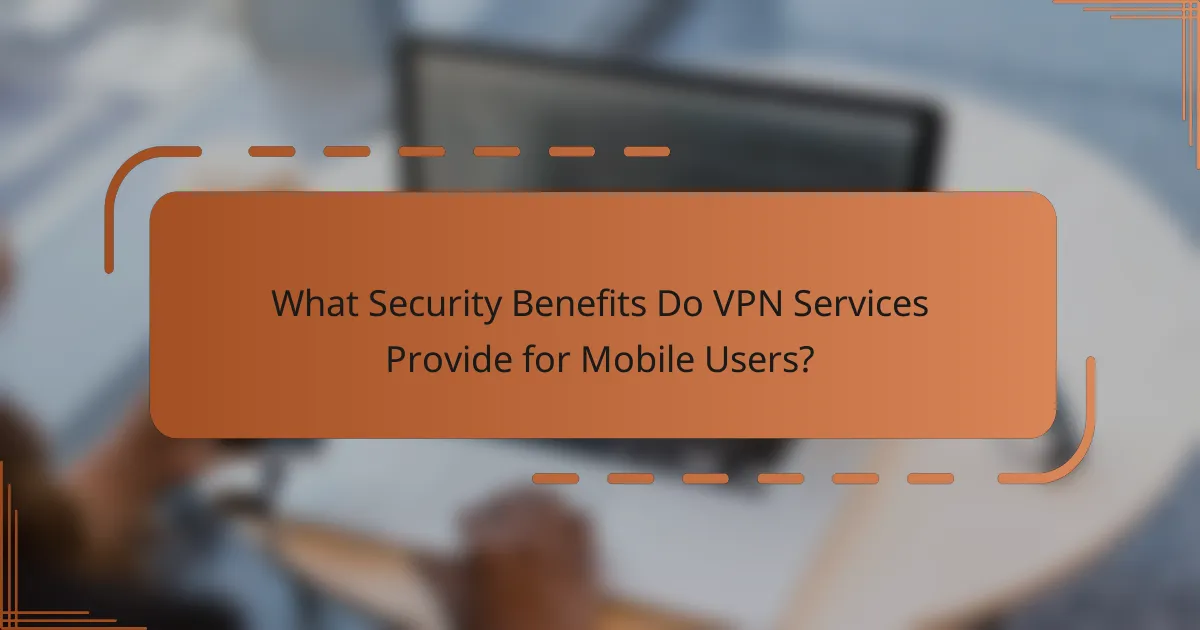
What Security Benefits Do VPN Services Provide for Mobile Users?
VPN services provide several security benefits for mobile users. They encrypt internet traffic, which protects data from interception. This encryption is crucial when using public Wi-Fi networks, where data is vulnerable to eavesdropping. VPNs also mask the user’s IP address, enhancing anonymity online. This makes it harder for third parties to track user activity. Additionally, VPNs can bypass geo-restrictions, allowing access to content securely. They often include features like a kill switch, which disconnects the internet if the VPN fails, preventing data leaks. According to a study by the University of Maryland, using a VPN can significantly reduce the risk of data breaches on mobile devices.
How do VPN Services protect sensitive information on mobile devices?
VPN services protect sensitive information on mobile devices by encrypting internet traffic. This encryption creates a secure tunnel between the device and the VPN server. It prevents unauthorized access to data during transmission. VPNs also mask the user’s IP address, enhancing anonymity online. This makes it difficult for third parties to track user activities. When using public Wi-Fi, VPNs safeguard against potential threats. A study by the Cybersecurity & Infrastructure Security Agency found that VPNs significantly reduce the risk of data breaches. Overall, VPN services are essential for maintaining privacy and security on mobile devices.
What are the risks of not using a VPN on mobile devices?
Not using a VPN on mobile devices exposes users to several risks. These include data interception by hackers on unsecured networks. Public Wi-Fi networks are particularly vulnerable to such attacks. Without a VPN, sensitive information like passwords and credit card details can be easily accessed. Additionally, users face risks of tracking by advertisers and third parties. This tracking can lead to privacy invasions and targeted ads. Moreover, not using a VPN can result in geo-restrictions on content access. Certain websites and services may be blocked based on the user’s location. Overall, the absence of a VPN compromises security, privacy, and access to information.
How do VPNs safeguard against malicious attacks on mobile networks?
VPNs safeguard against malicious attacks on mobile networks by encrypting user data. This encryption makes it difficult for attackers to intercept sensitive information. VPNs also mask the user’s IP address, enhancing anonymity. By routing traffic through secure servers, they create a protective barrier against potential threats. Additionally, VPNs can block malicious websites and prevent data leaks. This multi-layered security approach significantly reduces the risk of cyber attacks. Research shows that VPNs can mitigate risks associated with public Wi-Fi networks, where attacks are more prevalent. Thus, using a VPN enhances overall mobile network security.
What are best practices for using VPN Services on mobile devices?
Use a reputable VPN service on mobile devices for enhanced security. Choose a VPN with strong encryption protocols like OpenVPN or IKEv2. Always connect to the VPN before accessing public Wi-Fi networks. This prevents data interception by malicious actors. Enable the kill switch feature if available. This feature disconnects your internet if the VPN connection drops. Regularly update the VPN app to benefit from security patches. Avoid free VPNs as they may compromise your privacy. Finally, check for DNS leak protection to ensure your browsing remains private.
How can users ensure maximum security when using a VPN?
Users can ensure maximum security when using a VPN by selecting a reputable provider. A strong VPN should use robust encryption protocols like OpenVPN or WireGuard. Users should also enable features like a kill switch to prevent data leaks. Regularly updating the VPN software is crucial for security enhancements. Users should avoid free VPNs, as they may compromise privacy. Connecting to servers in privacy-friendly jurisdictions adds an extra layer of protection. Furthermore, users should be cautious about sharing personal information while online. Research shows that using a reliable VPN can significantly reduce the risk of data breaches and cyber threats.
What common troubleshooting tips can help with VPN connectivity issues?
Restart the VPN application to resolve temporary glitches. Check your internet connection to ensure it is stable. Verify that your VPN credentials are correct and up to date. Change the VPN server location if the current one is unresponsive. Disable firewall or antivirus software that may block VPN connections. Update the VPN software to the latest version for optimal performance. Use a wired connection instead of Wi-Fi for a more stable link. Clear the DNS cache to eliminate potential conflicts.
VPN services are essential tools that create secure internet connections by encrypting user data and masking IP addresses, thereby enhancing online privacy and security. The article explores the importance of VPNs, detailing how they protect against data breaches, improve mobile connectivity, and enable access to geo-restricted content. Key features such as strong encryption protocols, no-logs policies, and additional functionalities like split tunneling and kill switches are discussed, highlighting their impact on user experience and security. Furthermore, best practices for utilizing VPNs on mobile devices are outlined, emphasizing the significance of reputable services in safeguarding sensitive information.
